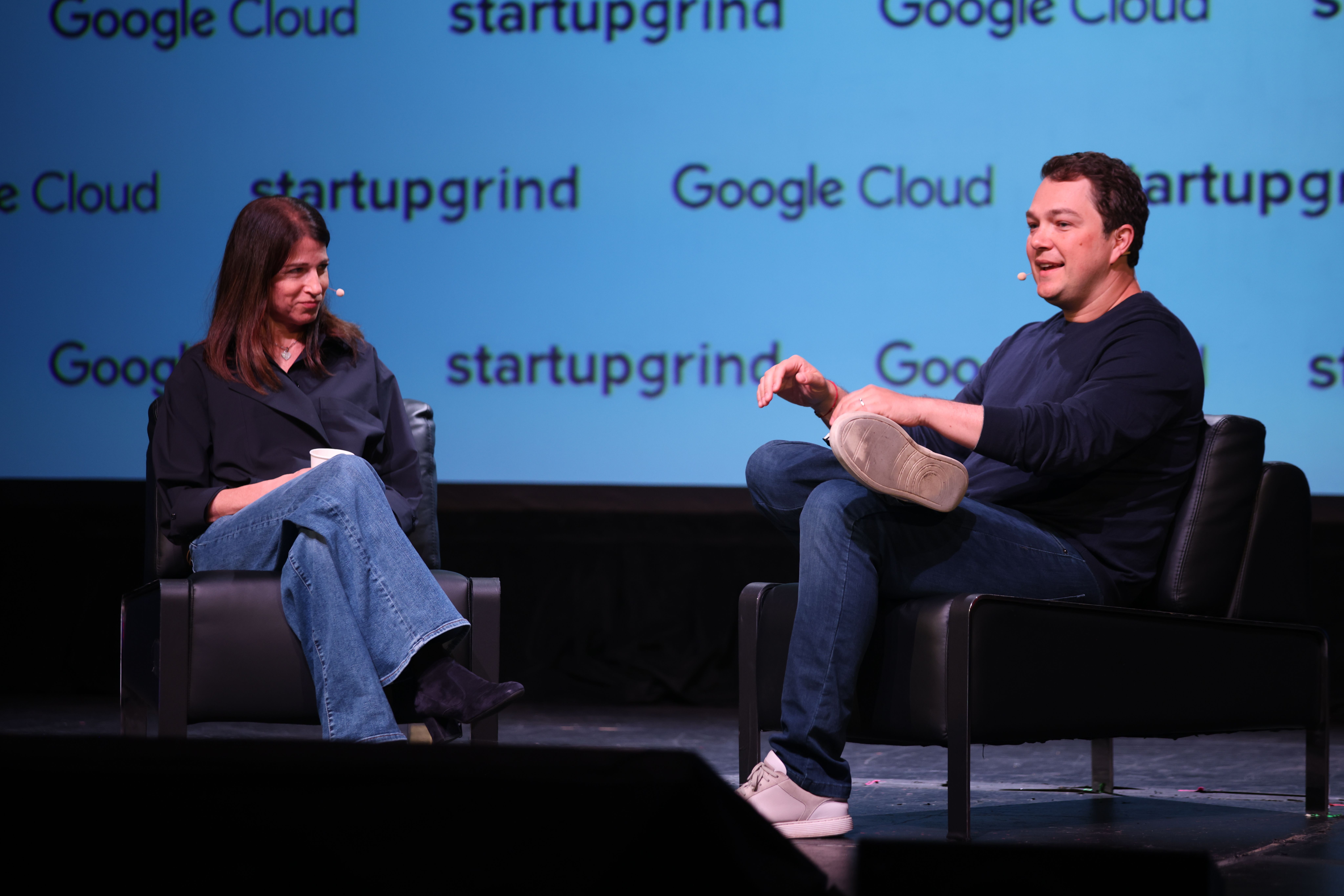Index OnAir: The Rise and Hype of Sneaker Culture

GOAT has helped build the market for trustworthy, authenticated online sneakers, while forging lucrative deals with high-end brands. GOAT Co-founder and CEO Eddy Lu and Index Partner Danny Rimer talk about GOAT’s journey from a shaky start to a sneaker powerhouse, moderated by WWD menswear reporter Obi Anyanwu.
Obi Anyanwu: We're here to talk about sneaker culture, which has its roots in sports and in hip hop youth culture. Could you both talk about what 90s and 2000 sneaker culture was like for you?
Eddy Lu: I was born in 1981, and I’d watch basketball with my grandpa and my dad all the time. We all wanted to be like Michael Jordan because he was just such an iconic player. So I started to fall in love with sneakers because of basketball, and the technology they were putting into shoes — the air bubbles, and Reebok pumps. I wanted to play my best and wear the sneakers the stars wore. I couldn't afford Jordans because they were $110, but I’d go to Footlocker and stare at them. From the hip hop side, Run DMC came out in 1986 with My Adidas — one of the very first collaborations between hip hop and sneakers. Between Jordan and Run DMC, I really think that was the genesis of this sneaker craze.
Danny Rimer: I’m less of a connoisseur. I grew up in Geneva, Switzerland, so we didn't see much basketball. But I was really into skateboarding and Vans were a phenomenon. This was the late 80s, and I had the brilliant idea in high school that rather than doing my homework I would take Vans orders from the entire school and figure out a way to import them in Switzerland to sell them. That was my first exposure to sneaker culture, and what amazed me was how passionate everyone got about them. You couldn’t even get Vans in Switzerland, yet everyone knew about them and everyone wanted a pair.
Obi: That shows how global sneaker culture is. Can you speak about how sneaker culture changed with the internet?
Eddy: Previously, to get a limited-edition sneaker, you'd have to camp out at different stores throughout the country. Friends would drive for hours and wait in line to get certain pairs of shoes. It was the hunt that was fueling this subculture among hardcore sneaker enthusiasts. But the internet has helped bring sneakers to the mass market. GOAT has 30 million members now and anyone in the world can get access to sought-after sneakers.
Danny: Sneaker manufacturers, in particular Nike, have been quite thoughtful about releasing different products in different geographies. So while you could go to any main street in a big city and find similar shops, the sneakers can be different.
Obi: The internet not only changed how we communicate and trade sneakers, it allowed us to access different styles and changed the way we shopped. But it took luxury and contemporary fashion brands a long time to step into e-commerce. Tell us about your interest in fashion e-commerce before GOAT.
Danny: When we set up Index in Europe, we were trying to think about what differentiated Europe from Silicon Valley and the US. It became evident that Europeans know quite a bit about fashion houses, so we looked around and found two really compelling companies: Asos, and Net-a-Porter. We were fortunate enough to be able to invest in both. It has taken lockdown for many fashion brands to think of the internet as a useful platform. Some of them still refuse to sell online, which is just shocking to me, because online the entire world can touch your brand.
Eddy: We've seen an acceleration of brands directly selling with GOAT. It's because GOAT leads with a point of view, culture and style. Our app offers a premier end-to-end customer and retail-like experience. Brands don't want to align with any random retailer online — they want a retailer that can showcase their products, make their products look and feel good, and also tell their story.
Obi: What was the launch of GOAT like? Can you share some of the hard decisions you had to make?
Eddy: My co-founder Daishin had been a lifelong sneaker enthusiast. He had his first pair of Jordans when he was 10 years old, bought by his dad when he got good grades. 23 years after the original Jordan 5 Grape was released, Nike re-released that shoe. Daishin had to have them for nostalgic reasons and went on eBay, which was the largest sneaker marketplace at the time.
He spent hours sifting through sellers’ reviews, comments, and photo sets and bought the pair of shoes. However, when he finally received them, they turned out to be fake. We started wondering how, in this day and age, we're still worrying about whether something we buy online is real or fake? GOAT was built on the idea of creating trust and safety, so our customers never have to worry if something's real or fake ever again. The heart of our business is authentication. Marketplaces are chaotic and messy, so we provide a retail-like experience for the customer on the front end, while GOAT deals with all the messy marketplace issues on the back end.
A lot of decisions, in the beginning, were based on talking to our sneaker-head friends. They wanted to see a picture of the actual product, rather than a stock photo. But we wanted people to trust GOAT to authenticate the product, so they don’t have to worry about seeing the actual sneaker. We knew people would grow to trust us over time, and we are becoming the gold standard of authentication and quality control.
Obi: How much of your business today was from planning, compared to new iterations along the way?
Eddy: When we started GOAT, we were playing in a billion-dollar total addressable market, so we were trying to gain share in that secondary resale market. There are estimates that the secondary markets are now worth $30 billion. It's not just a domestic US market anymore — we have buyers and sellers across the world, we have facilities now in Hong Kong, the Netherlands, and the UK.
When we started, we just wanted to gain share by providing a better experience than traditional marketplaces. We were only selling limited-edition, sought-after sneakers, launching in 2015 when Kanye signed with Adidas and the Supreme Jordan 5s came out.
We now have more than 100,000 unique styles and SKUs to choose from, and 40% of our sales are actually under retail price. We've built an infrastructure that allows people to buy sneakers within various price ranges throughout the world, and we've helped expand our total addressable market.
Danny: Part of the success of GOAT is that they did a pretty radical pivot. So many of the best companies and teams have had to do that, including Slack, Discord, and Twitter.
Eddy: We had to be very resilient to get to where we are today. GOAT was a completely different company when we raised our initial round of funding. We tried a couple of other ideas and none of them worked. Our investors wanted us to either give back the money or get acqui-hired by another company. That was the pressure we were feeling at that time.
But we knew we worked really well together. We had complementary skill sets and just didn’t seem to burn out. And then we had the vision about sneakers. Daishin knew the category well because he was such a sneaker enthusiast, and we knew we could build a great product experience. So we just said we’d give it one last shot, and GOAT was born.
Obi: It feels like it was a great idea, but also at the right time. Why do you think there was this convergence of sneakers and luxury fashion at this point, and what did it have to do with internet culture? Kanye West & Virgil Abloh were making waves in Paris, and before that the Air UNCs put Jordans back on the map, plus the way that brands, and Michael Jordan and ASAP Rocky were being reblogged on Tumblr.
Eddy: When I was a kid in high school, you could wear the same pair of sneakers every single day and it'd be OK. But this generation wants to accessorize, and change out their sneakers. It’s a statement about your aesthetics. As the world became more fashion-forward, the luxury houses saw that their customers were aging out a little bit and wanted to make sure to work with this next generation of shoppers. So there were really important collaborations between companies like Supreme, and luxury houses like LV with sneaker companies. Versace was the first company to directly sell through our platform. When they launched the ‘Chain Reaction’ sneaker, they knew GOAT had 30 million members who lived and breathed fashion, culture, and style. Many of the customers that purchased that first release had never bought a luxury sneaker previously.
Danny: When I was growing up I would buy an album on vinyl. I’d look at every image, learn every line and covet the album. It was the same with CDs. But with music streaming services, both the artists and the listener are now snacking on music instead, because everything's at your fingertips. Music was an identifier and a means of expression, and it has been replaced with fashion. That's why we invested in fashion-related startups.
With Tumblr, and Pinterest, and Instagram — we’re able to see much more, to identify and figure out what we like. Many artists have now become designers themselves — that cross-pollination is incredible.
Obi: Sneakers have always been traditionally related to men, but why did it take some companies so long to understand that women love sneakers as much?
Eddy: Women are the fastest-growing segment of new users on GOAT. When a female says they're a size seven women, we translate the sizing and show them all of the sneakers they can buy on our platform. Many sneakers are unisex; -- I’ve bought female sneakers, -- and many of my female friends buy male sneakers. Products are getting a lot more unisex beyond just sneakers.
Danny: Men have a bit of a uniform approach to fashion. Natalie Massenet, the founder of Net-a-Porter, is a guru in this space. When she launched Mr. Porter, she said men were crazy because if they liked a shirt they would just buy 12 of them. One of the few ways men have expressed their individuality historically was through the sneaker. Women have been much more open, much freer to express their unique style. For men, it was watches and sneakers.
Obi: What made GOAT such an interesting investment?
Danny: Daishin and Eddie were a well-oiled machine. They were resilient, super hungry, and wouldn't give up. They were already started by the time we invested, but we’d been to Flight Club and were amazed by the cult-like following. We met Flight Club and asked if they’d consider doing something online, and they weren’t interested until Eddie and Daishin pitched to them. They then pitched to us to raise the money for a merger. It was the best of both worlds.
Eddy: Flight Club is an iconic brand. We looked up to them because they were the best at brick and mortar sneaker consignment. We knew joining forces would give us an offline presence, and that the omnichannel is so important. Sneakers are such a tactile thing — you want to touch the sneakers, and try them on. We knew their strength in retail and our strength in digital would propel us forward.
Obi: How is GOAT differentiating itself from its competitors?
Eddy: There are a bunch of general marketplaces where you can sell sneakers alongside other everyday items. However, what sets GOAT apart from other platforms is that we’re not just a transactional site — we have a point of view on culture and style, but most importantly, we want to make people look and feel good. Brands are coming to us because they want to tell their story. GOAT is the best place to be, at the convergence of the primary and secondary markets. We represent the greatest products from the past, present and future.
Danny: There were competitors announcing right from the start that they were the cheapest, but the GOAT team said they wanted to build a brand that means something, that develops trust with their customers. It’s one of the biggest challenges with entrepreneurs of online businesses, folks are always focused on price. But the cheapest doesn't equate to the best service, and that’s what builds trust, loyalty and community. The best businesses are the ones that stand for something and are uncompromising about it.
Obi: The principle of not being the cheapest but being the best is true of both the primary and secondary markets. It’s one of the pillars of sneaker culture. How does that trend impact VC investments and the ecommerce space?
Danny: I have this discussion with entrepreneurs all the time. When we invested in Etsy, the commission rate they were charging was 3%, and today it's north of 13%. If you believe in your product and your service, and you feel good about it, there's no reason why it has to be bargain basement pricing. And it’s hard to survive on that kind of pricing — you have to pay for people, scale, logistics, inventory management, branding and marketing. You can’t do all those things on 3%.
Obi: What’s your next thesis for the fashion industry? What will be the next disruptive technologies and business models?
Danny: I'm a student of history, but we live in truly unprecedented times. What Eddy said about omni channel is 100% right.
We’ve migrated from physical primary and digital complement to digital primary and physical complement. But both have to be part of the value proposition to the customer. That's driving a lot of our investments.
Obi: Are there any risks to the growth of the sneaker market or broader casual streetwear and apparel?
Eddy: There are risks to any market, not just the sneaker space. I do think the brands’ focus has to be on quality products, and that they must understand that limited-edition, high-end products sell their mainstream products. Not everyone can afford a shoe that resells for thousands of dollars, like the Travis Scott Jordan 1, but they can experience it on GOAT and try it on in augmented reality. Brands have done a good job fulfilling the hype and marketing power they’ve associated with. It's about quality, and the demand is still there.
This transcript has been edited for clarity and length
Get more insights into the start-up landscape, more Founder interviews, and Company perspectives by subscribing to our channel.
Published — Oct. 2, 2020


